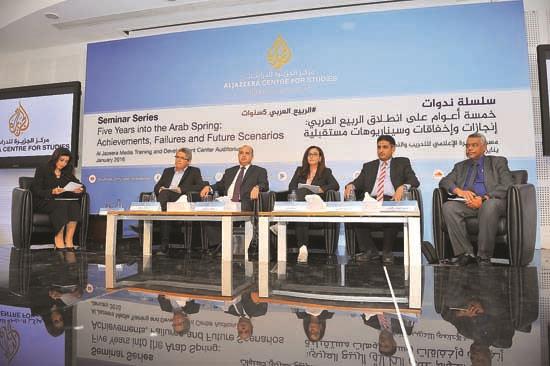
Qatar- Tunisia charter a key achievement says official
By Mohamed Osman
Doha: A major achievement of the Tunisian revolution has been the current constitution yet there are many challenges facing the last candle of democracy in the Arab Spring states says a senior Tunisian official.
After five years of Arab revolution Tunisia is the only lit candle despite challenges after the overthrow of the regime.
The main achievement of the revolution is the constitution ratified by a vast majority of Tunisians and it was an outcome of a long political battle which led to an agreement on the priorities undermining unnecessary differences said Adnan Mansser Director of the Presidential Cabinet and a former official spokesman for the Presidency of the Republic of Tunisia.
However there are major challenges facing democracy such as economic difficulties and corruption which is “making us lose around 100000 job opportunities annually” and this is creating disappointment among the youth he added.
The disappointment was reflected in the voter turnout in the last election in which only three million people cast their ballot while eight million people had participated in the previous election Mansser said.
The military’s neutral stance contributed to the current achievements. The military in Tunisia never interfered in politics since independence Mansser told The Peninsula when asked “why the stance of defence forces in Tunisia was different from that in other Arab countries”. Mansser who was speaking with four other panelists at the first seminar of a series organised by Al Jazeera Studies Centre emphasised that Tunisia has managed to establish a system whereby no one can override a democratically elected regime and so the revolution’s achievements have been protected.
The constitution addresses the rights of marginalised groups and has strengthened national unity by ending discrimination based on region and also facilitates local governance and political participation.
Mansser added: “There are many Western hypocrites who are exploiting our need for support and investment to impose their conditions which will affect our interests but publicly they speak in a different way”.
Continued from page 1
The second speaker was Awad Albaraasi Chairman Libyan Organisation of Policies and Strategies and a former deputy prime minister who said the current conflict in Libya was based on legitimacy power and wealth and the innocent people were paying a heavy price.
The armed revolution managed to remove the regime in a short time as Libya was the only country wh ich witnessed Western military intervention.
The collapse of the regime created vacuum in government institutions which were weak and ineffective because of corruption and an over-centralisation system applied by the former regime.
Although there are achievements but components of the revolution failed to manage their differences to combine the armed youth and this led to the spread of weapons chaos and the country pl unged into new armed conflicts.
Consecutive governments have failed to find solution for the over -centralisation system to end marginalisation provide services and combat poverty.
Arab people are patient but they do not like to be taken for a ride by any regime and despite challenges that faced Arab Spring revolutions people are resisting and revolutions have not ended said Neven Melek human rights activist and a former member of the Supreme Authority of Al Wasat Egyptian Party. She said all segments of Egyptian people suffered from marginalisation under the military rule since 1952 and the media contributed to exclusion oppression and promotion of hatred and extremism. Social media is the only window available for freedom of expression in Egypt today she added.
The situation in Yemen was highlighted by Waseem Al Qurashi spokesperson of the Organising Committee for the Youth of the Yemeni Revolution in 2011. “We in Yemen underestimated the situation thinking that within 15 days of mass demonstrations we will get rid of the regime and this proved to be wrong” he said.
The regime was deep-rooted in different sectors and to uproot it there was the need for more time and effort and unity. “Therefore we took Saleh away but his regime remained.” He said Yemenis are seeking to establish national armed forces consisting of all Yemenis and free of tribal family and sectarian affiliations. Abdel Wahab Al Afandi Professor of Political Science and Head of Political Science and International Relations Programme at Doha Institute for Graduates said observers expected that the Arab revolution will plunge into a situation similar to that of Somalia but instead it laid the foundation for the principles of democracy and freedom.
All segments of society took part in the revolutions but some mistakes of the revolutionary powers were exploited by the supporters of the old regimes in many countries and to achieve the goals of the revolutions they need to sink their differences Al Afandi said.
The Peninsula

Legal Disclaimer:
MENAFN provides the
information “as is” without warranty of any kind. We do not accept
any responsibility or liability for the accuracy, content, images,
videos, licenses, completeness, legality, or reliability of the information
contained in this article. If you have any complaints or copyright
issues related to this article, kindly contact the provider above.
















Comments
No comment